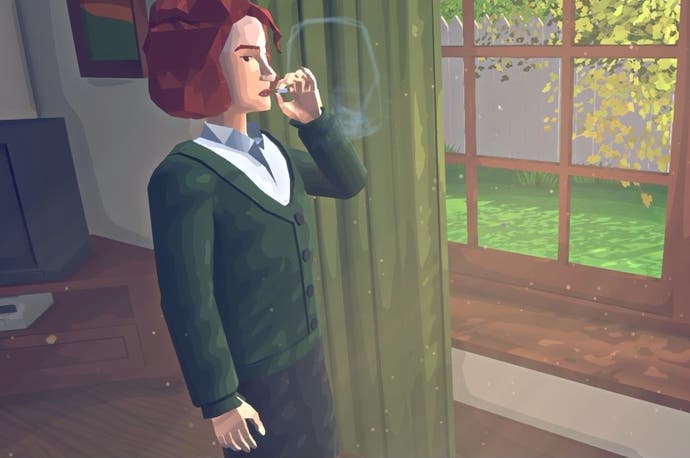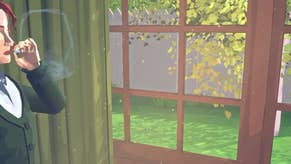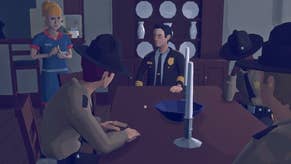What do you actually do in games?
AFK.
Here's a question: What do you do in Mario?
Good question. I love Mario! In Mario you run and jump and defeat enemies. You explore. You get from left to right. You sometimes climb flagpoles. If it's Mario 2 you pick and throw vegetables. If it's Super Mario World, you get to knock about on a dinosaur. If it's Mario Galaxy you dropkick meteors into the heart of a distant sun. Mario is pretty good when it comes to doing things. It excels at getting things done. It has purity, and it also has range.
But still, I don't think the answer is even that simple. When you're a kid, what you do in Mario is often quite different. You look to the horizon and wonder what it's like over there. You try to hop the warp-pipe at the beginning of 1-2, and when you can't, you wonder why you can't, and you wonder what would happen if you could. I once read a thing about a guy whose kids tried Mario Galaxy and afterwards would play with their toys on the underside of the kitchen table as well as the top. This was all doing stuff in Mario, if you ask me: it was using Mario physics to expand your options in the real world. (Actually, that sounds quite dangerous.)
Here's another question, slightly different from the first: when are you playing an adventure game? When you're moving the mouse over the screen, for sure. When you're triggering hotspots and combining inventory items. You're probably onto me now, so, yes, when you're looking for solutions on the internet - you're probably still playing an adventure game at that point, too. (Tim Schafer once remarked forlornly about the internet and adventure games: "Getting stuck? We used to call that gameplay.")
I'm going to speed this up at this point because I'm tiring of my own conceit. Yes, all of that stuff counts, but when I think back to my first run at Maniac Mansion, I also think of the notepad I kept by my bed for solution inspiration. I think of the time I passed a scrap of paper to Gareth in Biology, a scrap that simply read: "We should play the record to break the chandelier?" I think of the hours we spent trying to think our way around the door with the keycode lock on it, only to discover - very adventure games this - that the solution was to call up the game shop where we bought Maniac Mansion in the real world and ask if there might have been a passcode booklet missing from our copy.
In short, I think we are often a bit weird when we talk about what you do in games. This has never been more clear to me now, in fact, and not just because of No Man's Sky and the moment I landed on my fifth planet to see all the same stuff and asked myself - while simultaneously hating myself for asking - yes, but what am I meant to do with any of this? It's clear to me now because games are so interesting these days, and yet unless I'm careful I can find myself missing precisely what makes them interesting.
Take Virginia. It was out last week and I absolutely loved it. I was chatting to someone after I'd finished it, though, and they did ask: what do you actually do it in? In Virginia you walk through a beautiful, but linear, narrative adventure. There are no locked doors you have to think your way around, and there's nothing, really, to get stuck on as you go. Many have even noted that in some sequences you're not actually allowed to do anything at all before the scene ends and the edit whisks you away somewhere else.
But this, I would argue, is only a bit of what you do in Virginia. In Virginia, most of what you're doing is working out what the hell Virginia is actually about. You're pondering why it's showing you the things it's showing you, and what might draw them all together. No puzzles in the game? The whole game is a puzzle. You can finish Virginia - or beat it, in the naff American vernacular - and not have a clue what it was about. I'm not being smug. That was absolutely my experience. I only truly began to play Virginia after the credits rolled, when I thought about who I had been cast as, say, and I started to wonder about the ways in which their experiences might be different to mine.
I have a sense of how some people might reply to this: but couldn't they have put in a few things for me to do all the same? Happily, I played another game last week in which the developers did exactly that. The Bunker is also a game about exploring an environment and piecing together a story. I don't wish to be mean to it, because I really enjoyed a lot of it and I suspect the team is bound for greatness. But although you can literally do more stuff in The Bunker - you can hunt for collectables, you can get stuck when you haven't worked out where to go, you can stall on simple puzzles and lordy you can even die a few times! - the scope for the other kind of doing, the ruminatory doing that Virginia is so good at, is significantly reduced. The Bunker is a narrative game that is at pains to entirely solve its own narrative as it goes. Or, to put it another way, doing is still what you do with the control pad here. In the wider world around the game, there isn't much of anything else to do.
It strikes me that I'm back thinking about the writability of games, and that, really, writability and I should just get a room or something. But for a few hours this week I was playing a game that wanted me to think around it in order to get at what was deep inside it. It asked a different kind of doing of me. Why make it a game, though, eh? Why not make it a film or a book or whatever? Ha. Why not make it a game? And aren't those other things often games in the first place?














.png?width=291&height=164&fit=crop&quality=80&format=jpg&auto=webp)
